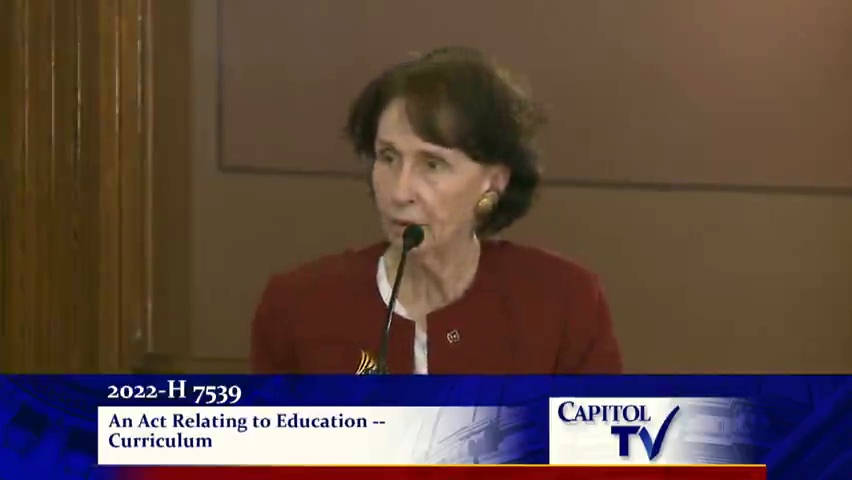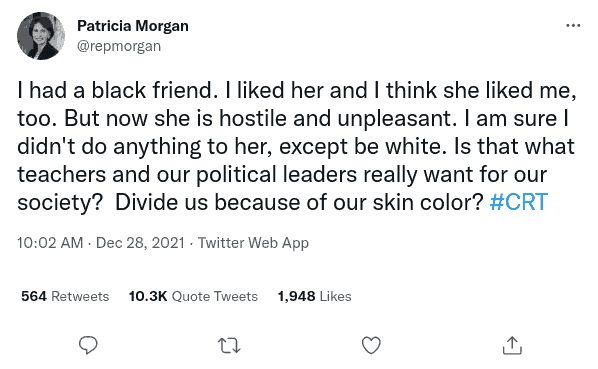
RI has not escaped the national trend of proposed legislation that would impose restrictions on discussing sexual orientation or gender identity in public schools or on teaching history in such a way as to make students feel discomfort on the basis of race, sexual orientation or gender identity. Rep. Patricia Morgan (R-West Warwick), who has a master’s degree in education and is a certified school principal, introduced H.7539. The bill received a hearing before the Education Committee on April 11 – but the bill has not moved forward and is widely assumed to be dead with no chance of passage; over the course of two-and-a-half hours, numerous legislators and members of the public testified against it so overwhelmingly that the overall impression was that they used the bill as a punching bag.

While couched in neutral terminology, H.7539 is so vague as to what it prohibits that it would inevitably chill discussion – which seems to be its real goal. The text provides, “Racial slurs or terms that describe race, ethnicity, gender or religion in a pejorative context shall not be presented or used in schools. Examples of prohibited terms include ‘supremacy,’ ‘racial guilt,’ ‘racial fragility,’ and other racial slurs or terms used to cast negative opinions on individuals based upon race, ethnicity, gender, or religion.” But it would be impossible to teach legitimate history without explaining that slavery and Jim Crow were grounded in and justified by white supremacy, and there is no shortage of primary documentary evidence for that, including the acts of secession by Southern states as to why they joined the Confederacy in the Civil War. The bill text includes a laundry list of political myths that are impossible to reconcile with real history, such as “Meritocracy or traits such as a hard work ethic are not racist but fundamental to the right to pursue happiness and be rewarded for industry.”
In his testimony, Steven Brown of the RI ACLU pointed out that the bill claims to oppose censorship while mandating it, with explicit bans such as “Schools shall not use the 1619 Project curriculum or any other curricula that pursues a predominantly ideological and/or activist outcome… Values, psychological and medical counseling, and political activism shall not be taught in classrooms or in any school setting.” Organized by The New York Times, the 1619 Project offers an interpretation of American history beginning with the date that enslaved Africans were first brought to what would become the United States; historian Nikole Hannah-Jones was awarded a Pulitzer Prize for her contribution. As Brown sarcastically said, eliminating every book from the school curriculum with a viewpoint would result in nothing but The World Almanac.
The bill also takes aim at issues important to the LGBTQ community: “Sex education shall not explore sexual preference, gender dysphoria, or sexual lifestyles.” Schools must notify the parents of transgender children regardless of circumstances and even potential danger: “Children shall be addressed using their common names and the pronouns associated with their biological gender unless parental or guardian permission to do otherwise is obtained.” The bill is closely modeled on similar legislation actually enacted in Florida that opponents have ridiculed as the “don’t say gay” bill because its terms are so expansive as to plausibly prohibit a first-grader telling classmates that they have two mommies or two daddies.
A parallel bill, S.2501 in the Senate, sponsored by Sen. Elaine Morgan (no relation), a South County Republican, seems to have received even less consideration than P. Morgan’s bill in the House, not even scheduled for a committee hearing since it was introduced Mar 1. The E. Morgan bill bans transgender athletes in schools, restricting competition to the sex at birth: “If disputed, a student may establish sex by presenting a signed physician’s statement that shall indicate the student’s sex based solely on: (A) The student’s internal and external reproductive anatomy; (B) The student’s normal endogenously produced levels of testosterone; and (C) An analysis of the student’s genetic makeup.”
The controversy has been fomenting for months. Conservative web site Ocean State Currents reported accusations on Feb 16 by Bob Chiaradio that Westerly public schools were making available “pornographic materials,” citing the books Gender Queer, Fun Home, and Beyond Magenta. These books are not regarded as pornographic by mainstream educators, and they have won numerous awards: Beyond Magenta was named the 2015 winner of the Lambda Literary Award for LGBT Children’s/Young Adult Literature, and the Broadway production based on the Fun Home graphic novel won five 2015 Tony Awards, including Best Musical.
Another conservative web site, Legal Insurrection, published an article by Providence Public Schools teacher Ramona Bessinger arguing that traditional historical subjects, such as the Holocaust, were being pushed out of the curriculum: “American history now is being retold exclusively from the perspective of oppressed peoples during the Revolutionary period through to the Civil War, and also in the literature of the Civil Rights movement. From my position in the classroom, it seemed that much of American history and literature was getting wiped out.” She alleged that false history was being introduced: “In some cases the book covers browned out the faces of historical characters like Lincoln to look black or brown, none of the books were recognizable, and all the booklets seemed to revolve around slavery or oppression. Perplexed, I thought there was a mistake. I asked a teacher leader what was going on and he looked jokingly at me saying ‘Comrade, we were told to remove all classroom sets of reading material in order to make room for the incoming sets of books.’ I laughed, assuming this was a joke. But it was not a joke, this was real and happening in my school, in my classroom.”
Chiaradio and Bessinger were supposed to be the principal speakers and presenters at an event scheduled for the evening of March 16 at Brewed Awakenings coffeehouse in Warwick, but it was canceled due to concerns about protesters showing up. As it happened, many people from both sides attended the event anyway, although Warwick Police kept the opposing groups separated.
Despite all of the attention and controversy given to local versions of “don’t say gay” bills in RI, they appear to have no chance of passage.



